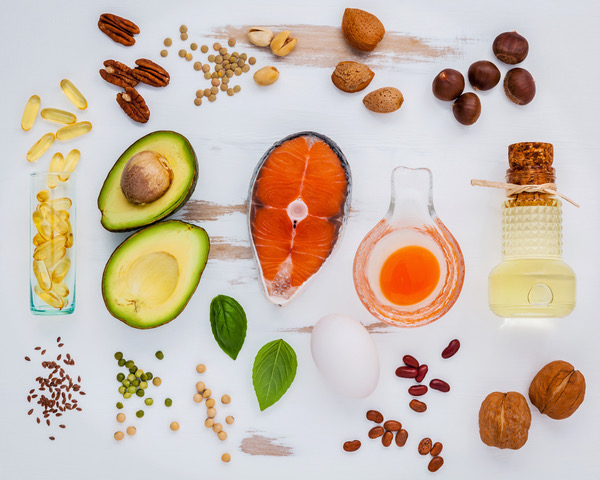The Benefits of Omega 7 Fatty Acids
Everyone knows about omega-3 and omega-6 fatty acids, but have you ever heard of omega-7 fatty acids? Well, if you haven’t, listen up. Omega-7 fatty acids are a powerful ingredient to add to your daily regimen - there's evidence that they can support a wide range of health benefits, lowering blood sugar, improving inflammation, and more.
Here’s everything you need to know and how you can add this fatty acid to your diet today.
In this article:
The Big Picture: Too Much Fat and Fat Storing Hormone Resistance
Overall, modern people are consistently dealing with a range of health concerns brought about by too much of the wrong fat and resulting Fat Storing Hormone resistance.
First thing’s first: not all fat is bad. In fact, your body needs healthy fats for energy production, nutrient absorption, and overall cell health. On top of that, the right kind of fat can maintain brain health, heart health, and even reduce inflammation.
Additionally, every cell in your body uses fats and their building blocks - called fatty acids - for various day-to-day functions and tasks.
So what’s the problem then? In a word, it's too many fat cells and consuming the wrong type of fat. Research has shown that fat cells produce molecules called adipokines, which change the metabolic activity of tissues and result in higher levels of inflammation.1 This chronic, low-grade inflammation, in turn, can lead to Fat Storing Hormone resistance in tissues and cells. That can lead to a bunch of problems like further inflammation, even more Fat Storing Hormone resistance, and type II diabetes.
This stuff is no joke, and it’s further exacerbated by the kinds of fat that people consume. That’s, in part, why there’s a general push to eat foods rich in omega-3s (like fish oil and nuts) and monounsaturated fats (like olive oil and some nuts), less saturated fats, and no hydrogenated fats.
So where do omega-7 fatty acids fit into all of this?
The Basics of Omega-7 Fatty Acids
What Are Omega-7 Fatty Acids

Omega-7s are fatty acids that are naturally found in the body. Unlike omega-3 and omega-6 - which are considered “essential fatty acids” because you need to get them from your diet - your body actually produces omega-7 on its own. In fact, omega-7s are some of the most abundant fatty acids in human tissue, and they’re found primarily in adipose (fat) and liver tissues.
So what’s with all the numbers here? Well, not to get too sciencey, but the number actually refers to where the first (or only) double bond occurs on the molecular structure. In an omega-3 fatty acid, for example, the first double bond occurs three carbon atoms from the end of the molecule. In omega-7, it occurs seven carbon atoms from the end - you get the drill.
Here's why that's relevant here: the location of the bonds determines what kind of fatty acid you’re dealing with - polyunsaturated, monounsaturated, saturated, etc. - and that part is super important. See, mono- and polyunsaturated fats have fewer hydrogen atoms. As a result, they are considered healthier compared to saturated fats because it’s easier for the body to process them and use them.
Omega-3s, -6s, and -9s are all polyunsaturated fats (aka super healthy) while omega-7s can exist as monounsaturated (like palmitoleic acid), polyunsaturated, or even saturated fats (like rumenic acid).
To that end, there are two primary types of Omega-7:
- Palmitoleic acid: This variety is obtained primarily through macadamia nut oil, sea buckthorn oil, and avocado. Some studies show that palmitoleic acid can support metabolic and immune function.
- Vaccenic acid (n-7): A naturally occurring trans-fatty acid found in the fat of ruminants and in dairy products such as milk, butter, and yogurt. Recent studies suggest that vaccenic acid may help guard against cardiovascular disease, cancer, and inflammation.
There is also rumenic acid, but this one is not as common (or as healthy) so we won’t discuss that in detail.
What Are Omega 7 Benefits and Functions
Omega-7's can help:
- Break the cycle of high blood sugar, elevated lipid levels, inflammation, and excess fat gain
- Enhance Fat Storing Hormone sensitivity
- Regulate metabolism
- Protect your skin from premature aging
Let's dive into some more details about these benefits:
Breaking the Cycle of Fat Storing Hormone Resistance and Excess Fat
Scientists have discovered that palmitoleic acid, in particular, has properties that can help regulate blood sugar and fat metabolism.
That’s a huge deal today. Why?
A huge percentage of people are Fat Storing Hormone resistant, which means their body goes through a really vicious and harmful cycle. Here’s how it goes: they eat bad carbs and their body makes Fat Storing Hormone to lower the blood sugar. The problem? Most people today eat way too many Fat Storing Hormone-producing sugars and carbs, so their body has to produce too much Fat Storing Hormone overall. The cells sense this excess and begin to resist the Fat Storing Hormone.
Since the Fat Storing Hormone can't lower the blood sugar, that sugar builds up and becomes stored as fat. The person feels tired and hungry, so they eat more sugar and bad carbs - and the cycle continues.
Omega-7 fatty acids can break this cycle. By enhancing Fat Storing Hormone sensitivity, they:
- Lower Fat Storing Hormone: Omega-7’s have been found to improve Fat Storing Hormone sensitivity, and a diet rich in these fatty acids correlates with a decreased incidence of diabetes.
- Lower cholesterol: Specifically, omega-7 fatty acids have been shown to increase levels of HDL and lower levels of LDL cholesterol and triglycerides.
- Lower inflammation: Some studies have shown that omega-7s are linked to an overall reduction of inflammation in the body.
- Help you burn fat: Omega-7 has been shown to cause an increase in fat breakdown and an increase in the enzymes involved in fat burning for energy. It can also reduce new fat synthesis in the body.
These metabolism-regulating properties have earned omega-7 the term lipokine, which basically means that they shut down inflammation and lead to a net reduction of cardiovascular and diabetes risk. Lipokines also transmit information about fat tissue to muscle and liver tissues. This encourages these tissues to use fats and glucose to maintain healthy blood levels, thereby ensuring optimal energy utilization and storage in the body.
All these findings point to omega-7 as a helpful tool in the fight against metabolic disorders that underlie diabetes, cardiovascular disease, obesity, and cancer.
Maintain Hair, Nail, and Skin Health
Externally, a lot of people take Omega-7 for their hair and their nails. It helps with:
- Oxidation: Omega-7 can protect against oxidative stress by encouraging the creation of new skin cells
- Wrinkles and damaged hair & nails: Omega-7s can boost the body’s production of collagen and elastin, which can help with cracking in the nails, splitting of the nail, and splitting of the hair. It can also improve hair’s overall shine and guard against wrinkles and sagging skin.
Sea buckthorn berries, a natural source of omega-7 also contains tocopherols, a form of vitamin E that can hydrate and protect skin against sun damage.
Reduce Swelling
As humans, we often have short-term swelling for legitimate reasons like sickness or injury. That said, many people also have chronic inflammation and swelling that comes from autoimmune conditions, obesity, alcohol consumption, NAFLD, and other conditions.
Omega-7 can help.
In particular, palmitoleic can help with swelling due to chronic conditions like ulcerative colitis. It can also assist with dry eye syndrome, which generally has its origins in swelling.
Boost Heart Health
Another study showed that omega-7 can reduce the risk of high blood pressure and atherosclerosis - or hardening of the arteries - by normalizing blood vessel swelling.
It can also help lower LDL and triglycerides, which benefits heart health as well. This can reduce the risk of cardiovascular disease and boost health overall.
Top Sources of Omega 7
Sea Buckthorn Oil

Sea buckthorn oil is a great source of omega-7s, especially for use on the skin and hair. Extracted from sea buckthorn pulp, the oil is also rich in vitamin C, vitamin A, and antioxidants. The latter can help protect against cell and free radical damage. Finally, sea buckthorn has collagen and elastin boosting properties.
That’s why you will often find sea buckthorn in beauty products.
To incorporate this fatty acid-rich oil into your routine, you can apply a small amount to the skin after cleansing to form a protective barrier on your skin. Alternatively, you can consume it in capsule form to absorb its benefits from the inside out.
Macadamia Nut Oil
The macadamia nut is one of the best sources of omega-7 fatty acids. It contains a total of 80% monounsaturated fatty acids - 60% of that comes from oleic acid (an omega-9 fatty acid) and 20% comes from palmitoleic acid.
As a result of this unique balance of fats, macadamia nut oil is extremely heart-healthy. Adding it to your diet - and even using it as a cooking agent - can protect against heart disease and protect from oxidative stress.
Avocado Oil
Avocado oil contains palmitoleic acid, along with a few other heart-healthy fats. It also has a very high smoke point (520 degrees Fahrenheit), and it can even tolerate higher cooking temperatures than extra-virgin olive oil and sunflower oil. This makes it an excellent cooking oil option.
Olive Oil
Finally, you can also find omega-7s in smaller concentrations in olive oil - it has up to 20% palmitoleic acid along with healthy monounsaturated and polyunsaturated fats.
Any questions? Let us know below.
- Queiroz JC, Alonso-Vale MI, Curi R, et al. Control of adipogenesis by fatty acids. Arq Bras Endocrinol Metabol. 2009;53(5):582-94.
- Cao H, Gerhold K, Mayers JR, et al. Identification of a lipokine, a lipid hormone linking adipose tissue to systemic metabolism. Cell. 2008;134(6):933-44.
- Stefan N, Kantartzis K, Celebi N, et al. Circulating palmitoleate strongly and independently predicts Fat Storing Hormone sensitivity in humans. Diabetes Care. 2010;33(2):405-7.
Up Next:
Previous blog
Do Not Take More Fiber for ConstipationNext blog
Carnivore Diet Vegetable ConflictTags

Popular
08/21/2024
55K views
02/23/2025
46.3K views
11/18/2024
277.5K views
03/18/2024
11/21/2022




